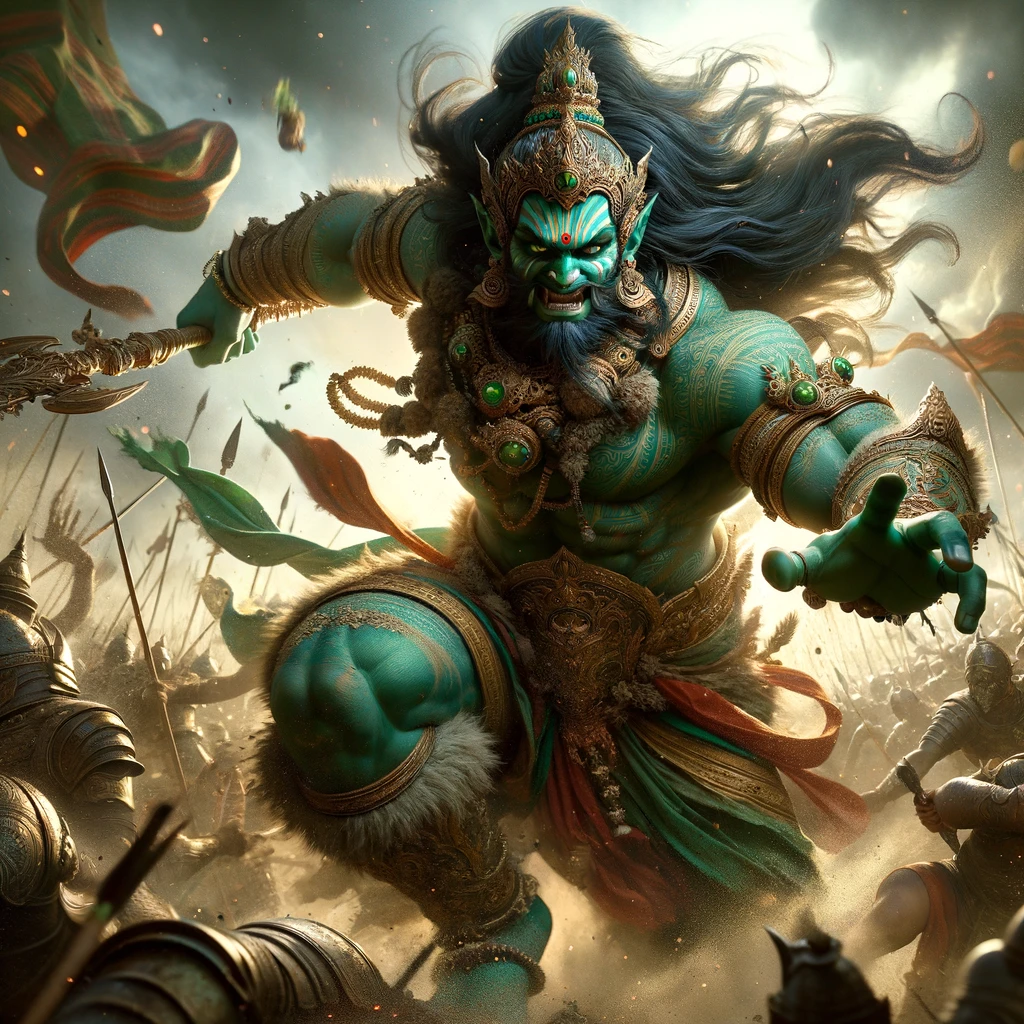Stepping over the defense wall, the gigantic Kumbhakarna speedily departed, emitting a loud roar that reverberated over the ocean, shook mountains and subdued thunderbolts. When the monkeys saw that the fierce-eyed Kumbhakarna, who could not be killed by Indra, Yamaraja or Varuna, was coming, they ran away. Seeing that the monkeys were fleeing, Sugreeva said to Nala, Nila, Gavaaksha and Kumuda: “Forgetting your heroic deeds and noble ancestry, where are you fleeing like ordinary panic-stricken monkeys? Enough, my dear friends! Please come back! Why are you trying to protect your lives? Surely this Rakshasa is not fit to fight with us. He is just a big scarecrow. By our prowess we shall kill this big Rakshasa scarecrow. Please come back!”
With great difficulty the monkeys were consoled and began gathering here and there. Grabbing tree trunks, the monkeys headed for the battlefield. The furious monkeys, who looked like elephants in rut, returned and attacked Kumbhakarna with boulders, mountain peaks and trees with flowering boughs. Though being struck, Kumbhakarna did not waver. When the boulders hit his arms, they shattered, and the flowering trees splintered and fell to the ground. Angered by this, Kumbhakarna began annihilating the monkey army, as a wild fire consumes forests. Like felled trees with reddish blossoms, many prominent monkeys were lying on the ground with their bodies drenched with blood. Jumping and running, the monkeys did not look back. Some of them fell into the ocean, while others remained soaring in the sky. When massacred by the Rakshasa in sport, the monkey warriors fled by the same path by which they had crossed the ocean. They fled down toward the plains, their faces pale from fear. The bears climbed trees and some hid on mountains. Some of them drowned in the ocean, and others hid in caves. Some fell down, and some were unable to stand up properly. Some had fallen on the ground, and others were lying on the ground pretending that they were dead.
Seeing the monkeys demoralized, Angada said: “Stay here! We shall fight! Come back, monkeys! I see no shelter for you in your defeat, even if you search the whole earth. Come back! Why are you trying to protect your lives? If you run away abandoning your weapons, your wives will laugh at you. That would surely be death for those accustomed to a comfortable life. Since you are born in large, noble families, why are you fleeing like ordinary panic-stricken monkeys? You are certainly ignoble, for out of fear you are abandoning your prowess and fleeing. Where are the boasts you made in assembles? Where are your helpful actions accompanied by tall talk? It is said: ‘Cursed is a coward who lives after being censured.’ Follow the path of the virtuous! Give up your fear! If in the course of our short lives we have to lie dead on the ground, we shall then achieve the abode of Lord Brahma, which is not possible for bad warriors. If we kill the enemy on the field of battle, we shall achieve glory. If we are killed, O monkeys, we shall enjoy the opulence of Brahma’s abode. Once Kumbhakarna sees Rama, he will not escape alive, no more than would a mouth approaching a blazing fire. Although we are distinguished warriors, if we protect our lives by fleeing, because we are many being driven away by one, we shall lose our glory.”
The fleeing monkeys replied to Angada, even as he was speaking, with the following words which were repulsive to the brave: “The Rakshasa Kumbhakarna has massacred us. It is not the time to stay. We are going, for life is very dear to us.” Having said this, all the monkeys troop leaders scattered in all directions upon seeing the monstrous Rakshasa with hideous eyes. The fleeing monkeys were reassured by Angada through various arguments, and thus they returned. Restored to high spirits by the intelligent Angada, the monkey troop leaders were all waiting for instructions. Rishabha, Sharabha, Mainda, Dhuumraa, Nila, Kumuda, Sushena, Gavaaksha, Rambha, Tara, Dvivida, Panasa and Hanuman marched off quickly to the battlefield.
Thus completes 66th Chapter of Yuddha Kanda of the glorious Ramayana of Valmiki, the work of a sage and the oldest epic.
Sriman Moola Rama Vijayate


